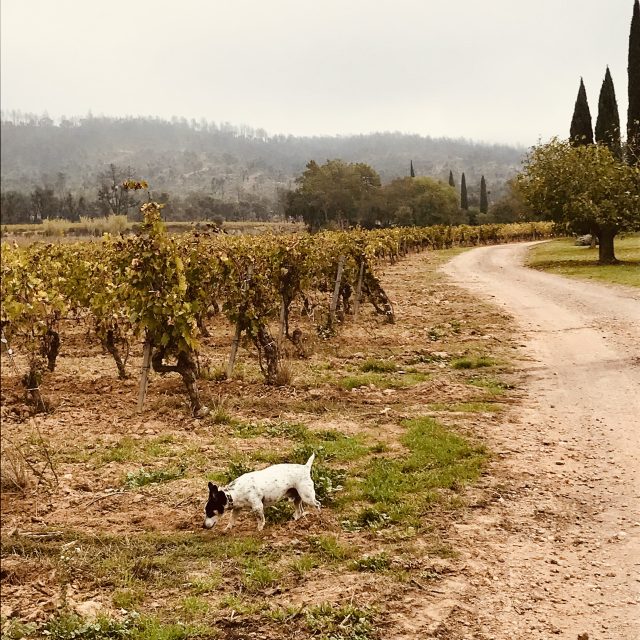This website uses cookies so that we can provide you with the best user experience possible. Cookie information is stored in your browser and performs functions such as recognising you when you return to our website and helping our team to understand which sections of the website you find most interesting and useful.
‘We can’t wait for consumers to demand it. We have to go out there and do it’
In part two of our interview with Provençal winery Maison Mirabeau, db chats to the Cronks about regenerative viticulture and why real vineyards are messy.

If anyone has witnessed the stratospheric trajectory of Provence rosé it’s husband and wife team Stephen and Jeany Cronk. Having upped sticks from South-West London in 2010 to move to the Côtes de Provence, they arrived just as pale pink wines were starting to take the world by storm and they’ve ridden the wild wave ever since.
The last five years in particular have seen Provence rosé establish itself as the leader of the pink pack, with exports of the region’s rosé growing by +64% in volume and 100% in value in 2021, according to Vins de Provence (CIVP). And wines from Mirabeau, the premium rosé brand founded by the Cronks, are now available in more than 60 international markets.
The drinks business caught up with the Cronks at Domaines Mirabeau over croissants, naturally, and some very strong coffee following the Maison’s first ever global meeting of its 30-strong team the night before. It’s perhaps testament to the quality of Mirabeau’s excellent wines that hangovers seemed notably absent and the team as fresh as daisies.
“We looked at 40 different vineyards before we settled on this one,” Stephen tells db. “So much of the decision was based on the feeling of the place – it was a really dense nature reserve at the time we bought it, but we just knew.”
The connection might have been there from the off, but eleven years on, the Mirabeau founders’ perception of what makes the perfect working vineyard has evolved.
“I used to dream of having the perfect vineyard in pristine condition with the little white picket fence, but we’ve come to realise that real, thriving vineyards are messy,” says Jeany, referring to the growing awareness among producers worldwide that the future of wines likes in a robust biodiversity and healthy soils teeming with life. “I hope that it will eventually become unacceptable to have super clean vineyards.”
Mirabeau itself is in the process of applying for B-Corp certification. “We’ve been waiting for an auditor to check our compliancy for six months but there’s a back log due to Covid. That will hopefully be our big news for 2023,” says Stephen, for whom regenerative agriculture and sustainability are much more than marketing buzzwords.
“We can’t wait for consumers to demand it. We have to go out and do it,” he says. And he’s more than prepared to put his money where his mouth is. Mirabeau donates 50% of the profits from its La Réserve estate wine towards the Regenerative Viticulture Foundation, which Stephen co-founded earlier this year.
The Mirabeau team have spent the last few years gently (and not so gently) cajoling their vines towards accepting a more balanced approach.
“There’s been this mindset for thousands of years that the vine should be the only crop in the vineyard,” says Jeany. “You’ve got to educate the vines that they’re not alone.” To this end Mirabeau has been gradually planting inter row cover crops – wheat, oat, clover – which the team hopes will eventually improve the structure of the soil and its nitrogen levels. There are two alpacas strutting about for grazing, and the Cronks are considering adding a handful of goats to the party. “We want people to be able to come here and touch the ground. That’s partly why we started this,” Jeany adds.
“You can hear birdsong here now, which you couldn’t when we first arrived,” says Stephen. “That’s how you know it’s working.”
It was to Jackson Family Wines that Mirabeau turned to for advice on weaning its vines off pesticides and abundant irrigation.
“It’s like weaning drug addicts off drugs,” he says. “I was a bit apprehensive at first but theyj told me ‘Stephen, just make them go cold turkey!’.”
Currently planted on the property are Grenache, Cinsault and Syrah; the predominant grapes in the Côtes de Provence for rosé production, as well as some Vermentino (Rolle). “We wanted to experiment with Tibouren (a local indigenous grape) but the terroir on our site isn’t quite right for it,” says Stephen.
Mirabeau’s 2022 harvest was hand picked to a playlist of funk tunes because “last year we had techno and it was a bit much,” says Jeany.
She told us that it’s looking to be a “very good vintage” for Cinsault, with ripe fruit its calling card this year. “We’re talking 13% instead of the usual 11%,” says Mirabeau’s winemaker and technical director Guillaume Cordonis.
“Freshness is important to us, but where has this obsession come from with people thinking that a wine must be dry for them to drink it?” asks Stephen. “There’s an assumption that fruity must mean bad and it’s not the case.”
Related news
Be the hype man (or woman) for your Merlot

